Present. Vulnerable. Authentic.
These three words took on an important new meaning to a group of non-profit leaders who gathered Oct. 5 in Waterloo to learn the finer points about the art of storytelling.
“You have to be those three things. You’ve got to be there, you’ve got to be open and you’ve got to be you,” said Andy Goodman, co-founder and director of the Los Angeles-based The Goodman Center (www.thegoodmancenter.com).
Goodman, a former non-profit executive director and former television writer whose credits include the 1990s family hit Dinosaurs, was at the Accelerator Centre sharing these tips and others via his new workshop ALOUD: A Workshop for Live Storytelling.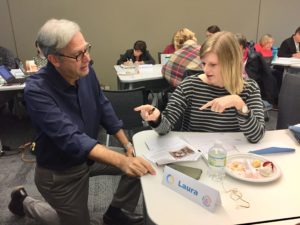
Nearly 30 non-profit representatives were on hand at the event – sponsored by the Kitchener Waterloo Community Foundation and hosted by Capacity Canada – to learn from Goodman, who is known internationally for his storytelling expertise and speeches.
In fact, Goodman has conducted more than 500 storytelling workshops worldwide aimed at assisting non-profits, corporations and government agencies learn to tell their stories in a better way
.
“What’s come back to us from these organizations is that when they learned to tell their story, it didn’t incrementally improve their communications, they said it transformed their communications,” he said explaining the beginning and ending are key to telling a great story.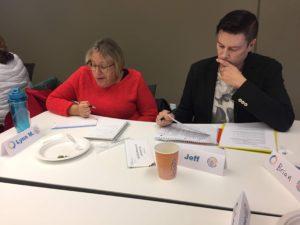
“Stories are about very specific moments and visual details,” said Goodman. “The first words out of your mouth and the last words, that’s what your audience will remember.”
Using several video examples, Goodman lead participants on a storytelling journey outlining the basic structure of a good story.
First and foremost, he explained every story must start with a protagonist the audience will identify with and want to follow.
“If you want to tell a story about your organization, your organization can not be the protagonist,” said Goodman. “People do not identify with non-profits, foundations and agencies, initiatives and programs. People identify with people,” said Goodman, noting the second step calls for an inciting incident to throw the protagonist’s world out of balance.
“It gives our protagonist a goal; something they want.”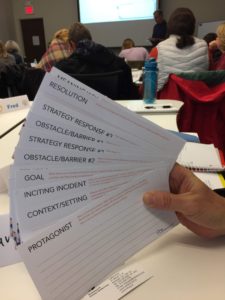
He said the third step, which calls for a barrier to be placed in front of the protagonist, is often the most difficult.
“In the world of non-profit storytelling, this is the part we tend to leave out,” said Goodman, adding without a barrier of some kind the story’s ‘success’ in the final stage won’t have any impact.
He explained this storytelling structure is universal and spans all cultures.
“Most human beings will recognize and respond to this situation,” he said. “Identification is important. It’s not pity but empathy.”
To ‘test’ their skill at storytelling, Goodman had each participant submit story ideas prior to the workshop and then gave them two opportunities during the workshop, using his advice, to share their stories with their fellow participants.
Not surprisingly, the second time they shared their stories showed a clear improvement, much to the delight of the participants, including Jeff Hunter, fund development and communications co-ordinator of Kinbridge Community Association.
“What stuck with me is the importance of creating the background for the protagonist and ensuring that just the right amount of description is provided so that the audience can identify with the individual and feel a sense of connection to the overall story,” he said, following the three-hour workshop.
Leanne Brown, fund development co-oridnator with Carizon, agreed.
“What stood out most for me was actually the people in the room, the energy and passion was very evident,” she said.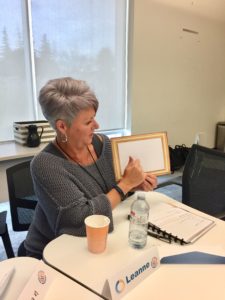
Hunter said he also appreciated the story cards Goodman provided participants to map out their stories.
“I left the workshop wishing there had been more time for the session,” he said.
Goodman said wanting more time is a good indication ALOUD is on the right track as it continues to develop.
“When people go to a workshop and say, ‘I wish I was there longer’, that’s the best compliment of all,” he said, adding the need for better storytelling among non-profits as well as corporations is imperative.
Goodman said ALOUD was created to help them meet this need, now that many see how important storytelling has become.
“For the last 15 years we’ve been doing a workshop that started with making the case for storytelling,” he said in an interview. “But after 15 years, our clients have come back and said we get it, we just want to get better at telling those stories. Now the workshop is focused on the actual act of telling a story.”
Goodman said too often non-profits get caught up in their own jargon and that while statistics and metrics are important, they don’t paint a clear picture for potential benefactors.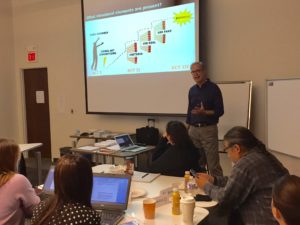
“All that stuff is important, but they have to understand that people need a story,” he said. “I’m just trying to remind them to keep that other stuff but start with a story.”
Kitchener Waterloo Community Foundation Vice-President Lynne Short agrees.
“Everyone remembers a great story they have heard,” she said. “One that made them laugh, cry or inspire them in some way to take action.”
Short said she also admired Goodman’s approach with participants.
“Andy Goodman provided workshop participants with a unique hands-on learning opportunity to develop techniques to improve their storytelling capabilities in an engaging and repeatable way,” she said.

